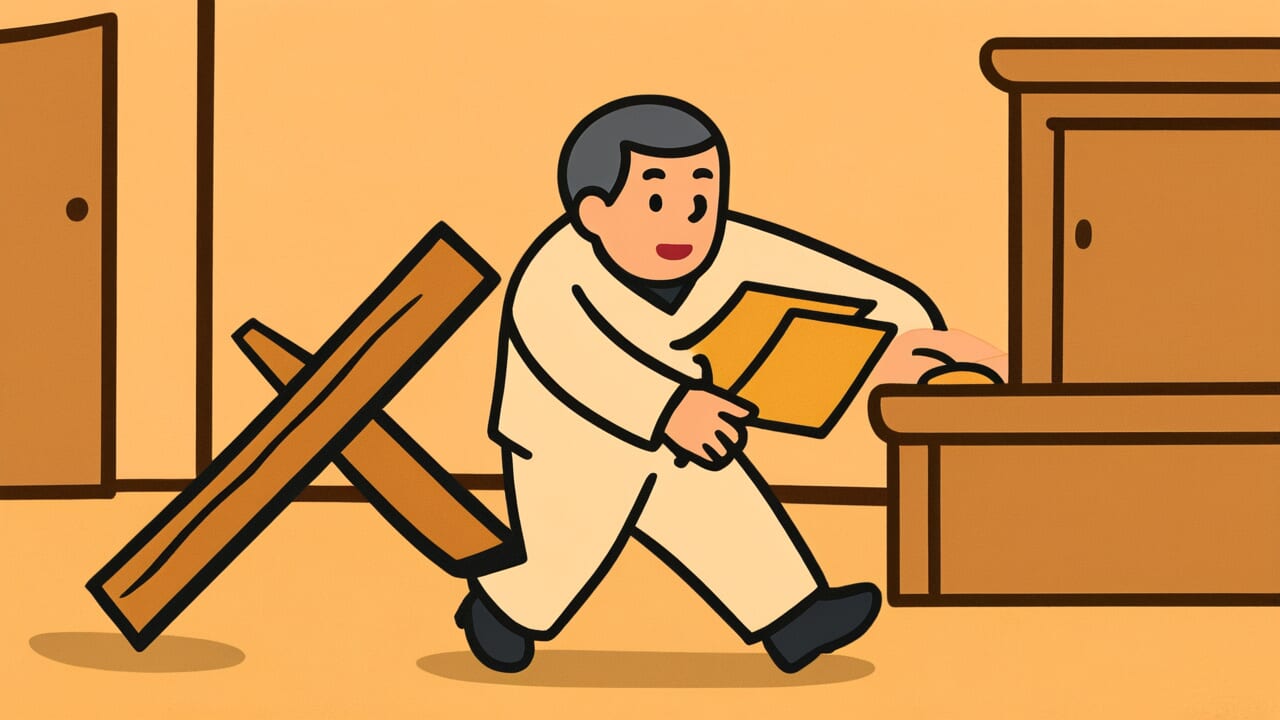How to Read “When the ruler seeks timber, the subjects leave trees standing”
kami, zai wo motomureba shin wa ki wo nokou
Meaning of “When the ruler seeks timber, the subjects leave trees standing”
This proverb warns about what happens when a leader’s intentions don’t reach their followers correctly. When those at the top ask for something, it can backfire completely.
The irony is clear: when the ruler requests timber, those at the bottom become so afraid of making mistakes that they hold back the trees. In the end, the original goal fails.
This saying applies to situations where organizational communication breaks down. It describes when instructions get twisted as they travel down the chain of command.
For example, a boss calls for bold action, but employees become timid and passive instead. Or people lose sight of the real purpose and obsess over the methods.
Today, we often understand this proverb in terms of leadership and organizational management. It shows how fear, misunderstanding, or excessive second-guessing creates gaps between what leaders intend and what workers actually do.
This proverb teaches both those who give instructions and those who receive them. Mutual understanding and communication matter deeply.
Origin and Etymology
No one knows the exact source of this proverb. However, it likely comes from ancient Chinese philosophy, especially Confucian ideas about governance.
“Jō” means the ruler or leader. “Zai” refers to timber or building materials. “Shin” means subjects or officials. “Nokou” means to hold back or spare.
The structure of the phrase shows how instructions change as they move down through layers of authority. It uses the concrete example of gathering timber to illustrate this problem.
Imagine a ruler commands: “Gather good timber to build a magnificent building.” The officials at the bottom think: “We mustn’t cut too many trees or we’ll be punished.”
So they hold back and don’t collect enough materials. The ironic result? The ruler’s desired building never gets built.
This expression likely emerged from the complexity of bureaucratic systems in ancient China and Japan. In hierarchical societies, officials at each level would distort instructions out of self-preservation or misunderstanding.
This was a universal problem in layered organizations. The proverb has been passed down as a sharp lesson for rulers and managers about the difficulties of running organizations.
Usage Examples
- The CEO called for aggressive investment, but every department started cutting budgets instead. It’s exactly “When the ruler seeks timber, the subjects leave trees standing.”
- Top-down reforms getting watered down at ground level proves the old lesson: “When the ruler seeks timber, the subjects leave trees standing.”
Universal Wisdom
This proverb reveals a universal truth: human fear distorts organizational goals. When leaders ask for something, their words carry expectations and hopes.
But those below fear what will happen if they fail to meet those expectations.
Why can’t people correctly understand what their superiors want? Because humans fundamentally fear failure.
The subjects who spare the trees aren’t lazy. They’re actually too conscientious. They worry: “What if I cut too many trees and get scolded?”
This excessive caution ironically prevents them from achieving the goal.
Looking deeper, this proverb describes the disconnect created by power distance. Between top and bottom exists not just physical distance, but a psychological wall.
Leaders think their intentions are crystal clear. But their followers can’t see the true meaning. This invisible wall distorts communication and makes organizations inefficient.
As long as human society has hierarchical structures, this problem will persist forever. That’s why our ancestors preserved this lesson in words.
They continue to sound this warning for future generations.
When AI Hears This
In information theory, noise gets added each time a signal passes through a transmission channel. The original information degrades.
This proverb demonstrates that mathematical principle playing out in organizations.
Suppose the top sends out a request: “I want good timber.” As information, this is a small signal.
But as it travels down through organizational layers, each level adds noise in the form of psychological bias. People want to “please the boss” or “get good evaluations.”
The section chief thinks: “Let’s gather extra.” The unit leader thinks: “Let’s add even more margin.” Each person stacks on safety buffers.
Information theory has a concept called signal-to-noise ratio. This ratio worsens as layers increase.
What’s especially notable is that this noise amplifies multiplicatively, not additively. If a five-layer organization has each level add 1.5 times “just to be safe,” the final instruction becomes 7.6 times excessive.
The original signal “seek timber” gets completely buried. It transforms into the distorted command “clear-cut the entire forest.”
Digital communication uses error-correcting codes to prevent this problem. But human organizations critically lack the feedback loop of “checking the original instruction.”
Lessons for Today
This proverb teaches modern people the importance of “sharing purpose” in communication.
If you’re in a position to give instructions, don’t just say “what to do.” Explain “why it’s needed” as well.
When purpose is shared, people can judge flexibly according to the situation. But if you only communicate methods, people become timid and may act in ways that miss the original goal.
On the other hand, if you’re receiving instructions, try to understand the intention behind the surface words. Have the courage to ask: “What is this for?”
If you proceed without understanding, you might end up like the subjects who spare trees. Your well-intentioned actions could backfire.
Modern society is complex. Things progress through many layers and departments. That’s why this proverb’s lesson matters more than ever.
Don’t lose sight of the real purpose through fear or excessive consideration. And don’t hesitate to dialogue for mutual understanding.
That’s your first step toward preventing “When the ruler seeks timber, the subjects leave trees standing” in your own environment.



Comments